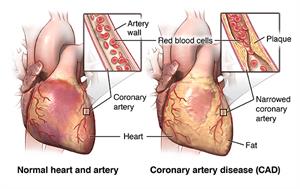Omega-3 Fatty Acids and Coronary Heart Disease
Most Americans eat too much fat and too many calories. Along with a lack of exercise, this has led to an epidemic of obesity and diabetes. It's also contributed to keeping heart disease as the leading cause of death in the U.S. But what about omega-3 fatty acids?
Omega-3s are a helpful and important form of fat. Your body needs it but can't make it. Your body needs 2 forms of omega fatty acids. These are omega-3 and omega-6. Omega-3 is the most important. Experts believe that omega-3s help prevent coronary heart disease (CHD) in healthy people. They also believe omega-3s can slow progress of the disease in those who already have it.
Diet and heart disease
CHD is caused by atherosclerosis. This is a long-term process in which fatty deposits (plaque) build up on the inside of the coronary arteries. These are the blood vessels that supply the heart muscle with oxygen and nutrients. Over time, the coronary arteries become so narrow that the flow of blood to the heart muscle is decreased. Or it becomes easily blocked by plaque or a blood clot. CHD can cause chest pain, called angina, heart attack, or cardiac arrest.

Atherosclerosis starts when the inside wall of an artery is damaged by inflammation or high levels of cholesterol and triglycerides. Triglycerides are another form of fat in your blood. A diet high in fat, especially saturated fat, increases cholesterol and triglycerides. Artery damage can also be caused by high blood pressure, tobacco smoke, or diabetes. Keep your cholesterol and triglycerides at or below advised levels. This could help prevent heart disease. According to the National Heart, Lung, and Blood Institute, these levels are less than 200 mg/dL and a triglyceride level of less than 150 mg/dL.
Where omega-3s come in

To lower your levels of cholesterol and triglycerides, stay at a healthy weight and do moderate to vigorous physical activity most days of the week. Also eat a diet rich in vitamins, minerals, and fiber. Don't eat foods that are high in sugar. Also don't drink a lot of alcohol. This will help prevent high levels of triglycerides. Include fish containing omega-3 fatty acids at least twice a week.
In the average American's diet, about 20% of calories that come from fat are omega-3 and omega-6 fatty acids. Most of the omega fatty acids are omega-6s. Experts have found that people who eat foods with high levels of 2 of the omega-3 fatty acids, eicosapentaenoic acid (EPA), and docosahexaenoic acid (DHA), have low rates of CHD.
EPA and DHA are also called marine omega-3s. This is because they are found in fatty fish. Some of these fish are mackerel, lake trout, herring, sardines, albacore tuna, and salmon. They are also in supplements called fish oils. Another source for EPA and DHA is alpha-linolenic acid (ALA). This is found in soy and canola oils, flaxseed, walnuts, and other nuts. It can be changed into omega-3 fatty acids in the body, but its benefit in preventing heart disease is not as clear.
Experts believe omega-3 fatty acids may reduce the risk for CHD by:
-
Lowering the risk for abnormal heart rhythm, which can lead to sudden cardiac death
-
Lowering triglyceride levels
-
Reducing the growth rate of plaque that clogs blood vessels
-
Lowering blood pressure slightly
-
Helping prevent inflammation of the blood vessels and formation of blood clots
How much do you need?
The American Heart Association (AHA) advises that healthy people who don't have heart disease eat some type of fatty fish at least twice a week. And they should include oils and foods rich in ALA in their diet. Flaxseed, canola and soybean oils, and walnuts contain this acid.
Food is the best way to get omega-3 fatty acids. This is because food contains other healthy substances. For example, fish contains arginine, glutamine, and selenium. All of these may benefit the heart and blood vessels. Flaxseed and walnuts have substances that help lower total cholesterol.
Drawbacks of fish
There are some health risks when eating fish. Some types of fish may contain high levels of toxins such as mercury. Especially the older and larger predatory fish. Check local advisories about the safety of fish caught by family and friends in your local bodies of water.
Methylmercury is found in shark, swordfish, king mackerel, and tilefish. Tilefish is also called golden bass or golden snapper. Methylmercury is most dangerous in very young children and in people who are pregnant or likely to become pregnant. Fish low in mercury are shrimp, canned light tuna, salmon, pollock, and catfish.
Polychlorinated biphenyls (PCBs) are found in freshwater fish living in polluted waters. PCBs may cause cancer. These fish include lake trout, smelt, and freshwater bluefish. PCBs also are found in some farmed fish like salmon. Dioxin and similar compounds cause cancer. They can also depress the immune system and affect the central nervous system. You should check local advisory information before buying fish.
The benefits and risks of eating fish vary on a person's stage of life. This is the AHA's advice:
-
Children, and pregnant or nursing people should not eat potentially contaminated fish such as shark, swordfish, king mackerel, and tilefish. These have the highest level of mercury. See the FDA's Advice About Eating Fish for Pregnant Women and Parents for a complete list.
-
Middle-aged and older people, and people after menopause should follow guidelines from the FDA and Environmental Protection Agency on how much fish to safely eat. The benefits of eating fish outweigh the risks for this age group.
-
Eat a variety of fish to help decrease possible harmful effects from environmental pollutants.
Fish oil supplements
Many over-the-counter fish oil supplements are available. A prescription form is also available. Make sure the preparation has a good amount of EPA and DHA. Getting 150 to 500 mg a day of EPA and DHA may reduce the risk for CHD. Ask your healthcare provider if a fish oil supplement is right for you. Prescription fish oil supplements can cause burping and upset stomach. Take these with food or split up the doses to minimize side effects.